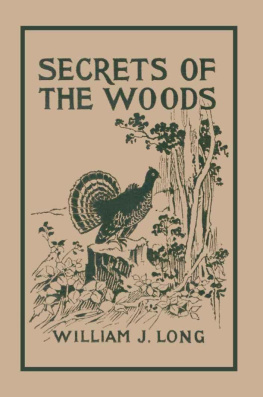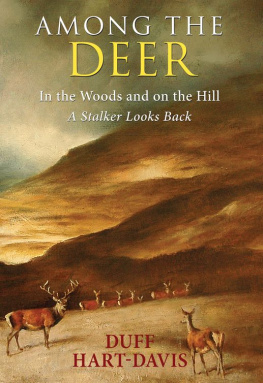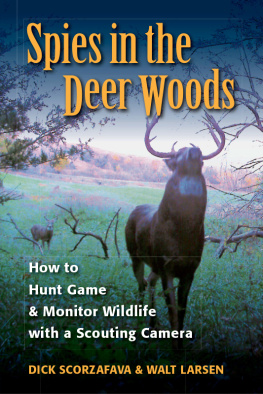William J. Long - Secrets of the Woods
Here you can read online William J. Long - Secrets of the Woods full text of the book (entire story) in english for free. Download pdf and epub, get meaning, cover and reviews about this ebook. year: 2006, publisher: Yesterdays Classics, genre: Detective and thriller. Description of the work, (preface) as well as reviews are available. Best literature library LitArk.com created for fans of good reading and offers a wide selection of genres:
Romance novel
Science fiction
Adventure
Detective
Science
History
Home and family
Prose
Art
Politics
Computer
Non-fiction
Religion
Business
Children
Humor
Choose a favorite category and find really read worthwhile books. Enjoy immersion in the world of imagination, feel the emotions of the characters or learn something new for yourself, make an fascinating discovery.
- Book:Secrets of the Woods
- Author:
- Publisher:Yesterdays Classics
- Genre:
- Year:2006
- Rating:5 / 5
- Favourites:Add to favourites
- Your mark:
- 100
- 1
- 2
- 3
- 4
- 5
Secrets of the Woods: summary, description and annotation
We offer to read an annotation, description, summary or preface (depends on what the author of the book "Secrets of the Woods" wrote himself). If you haven't found the necessary information about the book — write in the comments, we will try to find it.
Secrets of the Woods — read online for free the complete book (whole text) full work
Below is the text of the book, divided by pages. System saving the place of the last page read, allows you to conveniently read the book "Secrets of the Woods" online for free, without having to search again every time where you left off. Put a bookmark, and you can go to the page where you finished reading at any time.
Font size:
Interval:
Bookmark:
All rights reserved. No part of this book may be reproduced or retransmitted in any form or by any means without the written permission of the publisher.
This edition, first published in 2010 by Yesterday's Classics, an imprint of Yesterday's Classics, LLC, is an unabridged republication of the work originally published by Ginn & Company in 1902. This title is available in a print edition (ISBN 978-1-59915-022-2).
Yesterday's Classics republishes classic books for children from the golden age of children's literature, the era from 1880 to 1920. Many of our titles are offered in high-quality paperback editions, with text cast in modern easy-to-read type for today's readers. The illustrations from the original volumes are included except in those few cases where the quality of the original images is too low to make their reproduction feasible. Unless specified otherwise, color illustrations in the original volumes are rendered in black and white in our print editions.
T HIS little book is but another chapter in the shy 'wild life of the fields and woods, of which "Ways of Wood Folk" and "Wilderness Ways" were the beginning. It is given gladly in answer to the call for more from those who have read the previous volumes, and whose letters are full of the spirit of kindness and appreciation.
Many questions have come of late with these same letters; chief of which is this: How shall one discover such things for himself? how shall we, too, read the secrets of the Wood Folk?
There is no space here to answer, to describe the long training, even if one could explain perfectly what is more or less unconscious. I would only suggest that perhaps the real reason why we see so little in the woods is the way we go through themtalking, laughing, rustling, smashing twigs, disturbing the peace of the solitudes by what must seem strange and uncouth noises to the little wild creatures. They, on the other hand, slip with noiseless feet through their native coverts, shy, silent, listening, more concerned to hear than to be heard, loving the silence, hating noise and fearing it, as they fear and hate their natural enemies.
We would not feel comfortable if a big barbarian came into our quiet home, broke the door down, whacked his war-club on the furniture, and whooped his battle yell. We could hardly be natural under the circumstances. Our true dispositions would hide themselves. We might even vacate the house bodily. Just so Wood Folk. Only as you copy their ways can you expect to share their life and their secrets. And it is astonishing how little the shyest of them fears you, if you but keep silence and avoid all excitement, even of feeling; for they understand your feeling quite as much as your action.
A dog knows when you are afraid of him; when you are hostile; when friendly. So does a bear. Lose your nerve, and the horse you are riding goes to pieces instantly. Bubble over with suppressed excitement, and the deer yonder, stepping daintily down the bank to your canoe in the water grasses, will stamp and snort and bound away without ever knowing what startled him. But be quiet, friendly, peace-possessed in the same place, and the deer, even after discovering you, will draw near and show his curiosity in twenty pretty ways ere he trots away, looking back over his shoulder for your last message. Then be generousshow him the flash of a looking-glass, the flutter of a bright handkerchief, a tin whistle, or any other little kickshaw that the remembrance of a boy's pocket may suggestand the chances are that he will come back again, finding curiosity so richly rewarded.
That is another point to remember: all the Wood Folk are more curious about you than you are about them. Sit down quietly in the woods anywhere, and your coming will occasion the same stir that a stranger makes in a New England hill town. Control your curiosity, and soon their curiosity gets beyond control; they must come to find out who you are and what you are doing. Then you have the advantage; for, while their curiosity is being satisfied, they forget fear and show you many curious bits of their life that you will never discover otherwise.
As to the source of these sketches, it is the same as that of the othersyears of quiet observation in the woods and fields, and some old notebooks which hold the records of summer and winter camps in the great wilderness.
My kind publishers announced, some time ago, a table of contents, which included chapters on jay and fish-hawk, panther, and musquash, and a certain savage old bull moose that once took up his abode too near my camp for comfort. My only excuse for their non-appearance is that my little book was full before their turn came. They will find their place, I trust, in another volume presently.
Wm. J. Long.Stamford, Conn. June, 1901.

L ITTLE Tookhees the wood mouse, the 'Fraid One, as Simmo calls him, always makes two appearances when you squeak to bring him out. First, after much peeking, he runs out of his tunnel; sits up once on his hind legs; rubs his eyes with his paws; looks up for the owl, and behind him for the fox, and straight ahead at the tent where the man lives; then he dives back headlong into his tunnel with a rustle of leaves and a frightened whistle, as if Kupkawis the little owl had seen him. That is to reassure himself. In a moment he comes back softly to see what kind of crumbs you have given him.
No wonder Tookhees is so timid, for there is no place in earth or air or water, outside his own little doorway under the mossy stone, where he is safe. Above him the owls watch by night and the hawks by day; around him not a prowler of the wilderness, from Mooween the bear down through a score of gradations, to Kagax the bloodthirsty little weasel, but will sniff under every old log in the hope of finding a wood mouse; and if he takes a swim, as he is fond of doing, not a big trout in the river but leaves his eddy to rush at the tiny ripple holding bravely across the current. So, with all these enemies waiting to catch him the moment he ventures out, Tookhees must needs make one or two false starts in order to find out where the coast is clear.
That is why he always dodges back after his first appearance; why he gives you two or three swift glimpses of himself, now here, now there, before coming out into the light. He knows his enemies are so hungry, so afraid he will get away or that somebody else will catch him, that they jump for him the moment he shows a whisker. So eager are they for his flesh, and so sure, after missing him, that the swoop of wings or the snap of red jaws has scared him into permanent hiding, that they pass on to other trails. And when a prowler, watching from behind a stump, sees Tookhees flash out of sight and hears his startled squeak, he thinks naturally that the keen little eyes have seen the tail, which he forgot to curl close enough, and so sneaks away as if ashamed of himself. Not even the fox, whose patience is without end, has learned the wisdom of waiting for Tookhees' second appearance. And that is the salvation of the little 'Fraid One.
From all these enemies Tookhees has one refuge, the little arched nest beyond the pretty doorway under the mossy stone. Most of his enemies can dig, to be sure, but his tunnel winds about in such a way that they never can tell from the looks of his doorway where it leads to; and there are no snakes in the wilderness to follow and find out. Occasionally I have seen where Mooween the bear has turned the stone over and clawed the earth beneath; but there is generally a tough root in the way, and Mooween concludes that he is taking too much trouble for so small a mouthful, and shuffles off to the log where the red ants live.
Font size:
Interval:
Bookmark:
Similar books «Secrets of the Woods»
Look at similar books to Secrets of the Woods. We have selected literature similar in name and meaning in the hope of providing readers with more options to find new, interesting, not yet read works.
Discussion, reviews of the book Secrets of the Woods and just readers' own opinions. Leave your comments, write what you think about the work, its meaning or the main characters. Specify what exactly you liked and what you didn't like, and why you think so.













